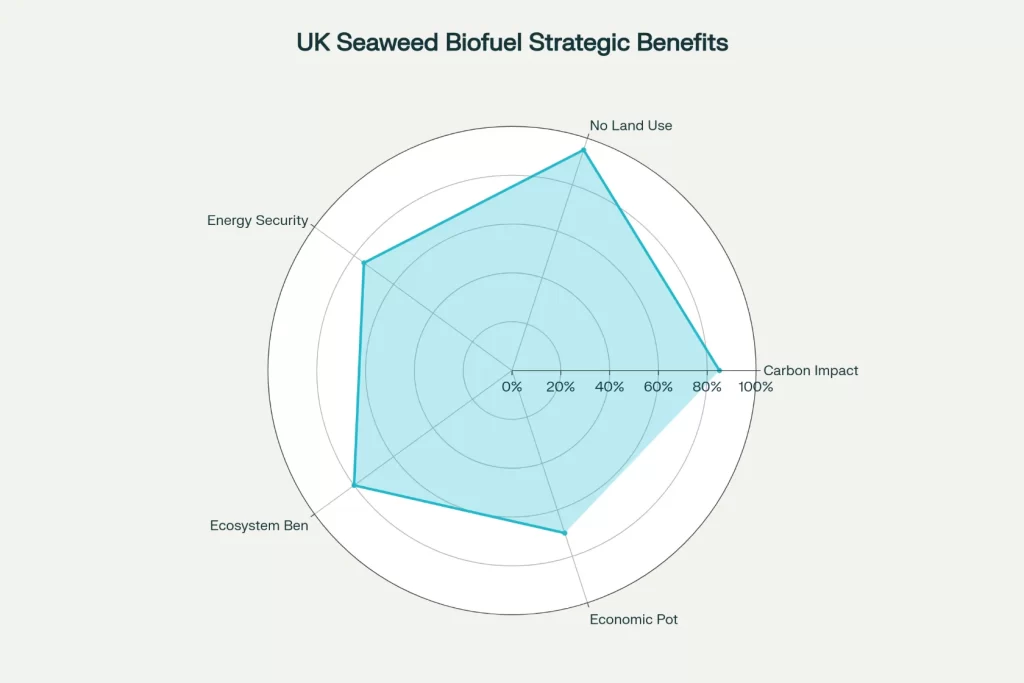The UK’s Green Gold: Could Seaweed-Derived Fuels Power a Sustainable Future?
The UK’s journey to reach its ambitious net-zero targets has mobilized numerous innovative energy solutions, and among these, seaweed is emerging as a transformative biofuel contender. More than just a marine food source, seaweed is gaining attention as a potent renewable energy feedstock with the potential to power the UK’s transport, heating, and electricity sectors in a sustainable, carbon-negative way. From Scotland’s rugged coastlines to North Yorkshire’s shores, the seaweed industry is expanding rapidly—with government backing and pioneering research driving its progress.
What Are Seaweed-Derived Biofuels?
Seaweed, or macroalgae, thrives by absorbing carbon dioxide and nutrients directly from seawater, growing exceptionally fast—some species doubling their biomass within days. This rapid growth and unique biology make seaweed an ideal feedstock for biofuel production.
Two primary methods convert seaweed into useful fuels:
- Biogas and Biomethane Production
Seaweed biomass undergoes anaerobic digestion, where microorganisms break it down without oxygen, producing biogas mainly composed of methane and CO2. Upgrading this biogas by removing CO2 yields biomethane, a clean renewable fuel compatible with existing natural gas infrastructure. Biomethane serves as a substitute for natural gas for heating, electricity, and transportation fuel. - Bioethanol and Bio-oil Production
Fermentation processes break down seaweed carbohydrates into sugars, which yeast ferments into bioethanol a direct petrol blend for vehicles. Alternatively, thermo-chemical processes such as pyrolysis convert seaweed into bio-oil, a liquid fuel precursor suitable for marine and aviation fuels. These options are especially vital for sectors that are hard to electrify, such as shipping and sustainable aviation fuel (SAF).
Seaweed’s lack of lignin the tough woody substance found in terrestrial plants—simplifies conversion and enhances fuel yield compared to land crops.
Why Seaweed is the UK’s Biofuel Superstar
The UK’s natural, economic, and policy environment makes it a prime candidate to lead the seaweed biofuel revolution.
- Carbon-Negative Potential
Seaweed absorbs significant CO2 during growth. When combined with bioenergy with carbon capture and storage (BECCS), seaweed biofuels can result in negative emissions, helping to actively reduce atmospheric carbon a critical advantage in fighting climate change. - No Land or Freshwater Competition
Unlike biofuels from terrestrial crops, seaweed farming avoids the “food vs. fuel” dilemma by using ocean space, sparing vital land and freshwater resources in the densely populated UK. - Domestic Energy Security and Job Creation
Growing a seaweed aquaculture industry reduces reliance on imported fossil fuels and biomass while creating green jobs in coastal communities that historically depend on fishing and traditional industries. - Ecosystem and Biodiversity Support
Seaweed farms serve as nurseries for marine life, enhance coastal biodiversity, absorb excess nutrients, and mitigate ocean acidification—creating important ecological co-benefits.

Radar chart illustrating the strategic benefits of UK seaweed biofuels across five key categories: carbon negative impact, no land use competition, energy security enhancement, ecosystem and biodiversity benefits, and economic potential. The chart highlights especially strong performance in no land use and carbon sequestration, emphasizing seaweed’s role as a sustainable and renewable energy source supporting the UK’s net-zero and green economy goals
The UK’s Seaweed Biofuel Pioneers
The UK government is actively supporting seaweed bioenergy development through programs like the Biomass Feedstocks Innovation Programme. Projects such as SeaGrown Limited in Scarborough receive funding focused on advancing offshore seaweed farming for fuel.
Leading companies such as Scotland’s Mara Seaweed and academic collaborators like the Scottish Association for Marine Science (SAMS) are innovating cultivation and processing methods. Their “multi-product biorefinery” approach maximizes economic viability by extracting fuel, food, cosmetics, and bioplastics from the entire seaweed harvest.
Universities across the UK conduct vital research on species selection, environmental impacts, and sustainable practices. This collective effort ensures the industry gains a robust social license to operate, balancing growth with societal and ecological needs.

Overcoming the Challenges of Scaling Up
Several obstacles must be addressed for seaweed biofuels to achieve large-scale success:
- Economic Costs
High upfront expenses for offshore farms, harvesting technology, and processing infrastructure currently make seaweed fuels costlier than fossil alternatives. Diversifying revenue through co-products can help offset these costs. - Scaling and Infrastructure
Expanding to meaningful production volumes requires building extensive supply chains, processing facilities, and identifying regulatory-compatible marine farm sites, demanding major public-private partnerships. - Technical and Biological Constraints
Conversion methods require optimization for different seaweed species, and seasonal growth variability must be managed through innovative storage solutions like ensiling. - Environmental and Social Considerations
Addressing potential localized impacts and user conflicts in marine spaces calls for transparent stakeholder engagement and adaptive management to sustain local support.
The Future of Seaweed in the UK’s Energy Mix
A key factor in developing seaweed-derived fuels in the UK is not only the technological feasibility but also the social and economic acceptance by stakeholders and the public. Research shows that while stakeholders in the seaweed and biofuel sectors are confident about the technological potential, concerns remain around scaling up cultivation, economic viability, and competition with other high-value seaweed products such as food and cosmetics. Public perceptions vary regionally, with coastal communities expressing both hope for economic benefits and concerns about environmental impacts, visual changes, and marine user conflicts. Successful development will require transparent communication, early engagement with local communities, and clear government policy support to reduce uncertainty and build trust. Addressing these societal dimensions alongside technical progress is vital to unlocking the full potential of seaweed biofuels in contributing to the UK’s renewable energy future. This comprehensive approach aligns with the UK’s broader bioeconomy strategy that emphasizes not just environmental sustainability but also social acceptance and economic development in coastal areas (Gegg, P., & Wells, V. (2019).
- Sustainable Aviation Fuel (SAF) offers a promising avenue, with seaweed bio-oil contributing to carbon-neutral air transport solutions amid stringent decarbonization pressures.
- Marine and Heavy Transport can benefit from seaweed biofuels as drop-in replacements for marine diesel, enabling near-term shipping decarbonization with minimal engine modifications.
- Grid Stability and Energy Storage improve by using seaweed-derived biomethane as a storable, dispatchable energy source balancing intermittent renewables like wind and solar.
By capitalizing on its extensive coastline and linking innovation with policy, the UK is poised to cultivate a thriving seaweed biofuels sector that supports climate goals, empowers coastal economies, and delivers cleaner energy for future generations. The rise of marine biofuels marks a new chapter in the UK’s green energy story with seaweed leading the way.
Citations
Gegg, P., & Wells, V. (2019). The development of seaweed-derived fuels in the UK: An analysis of stakeholder issues and public perceptions. Energy Policy, 133, 110924.
Read more about hydrogen vehicles powering the UK’s clean transport transition Renewable Energy Foundation (REF)